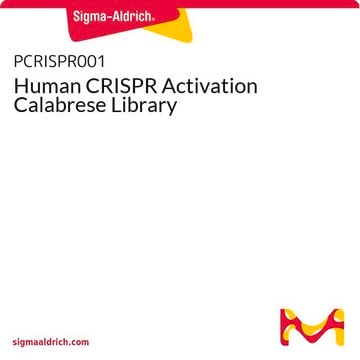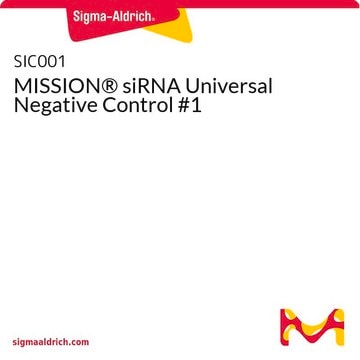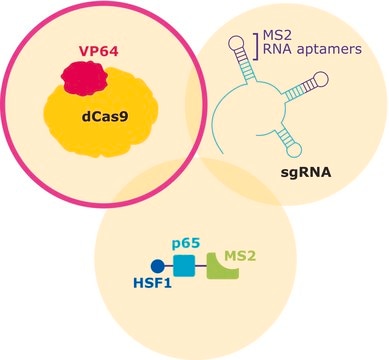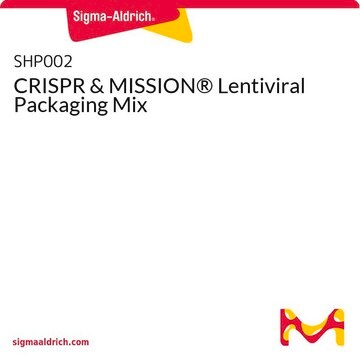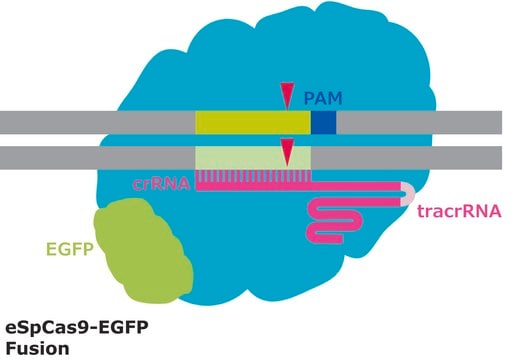SAMHELPERV
SAM CRISPRa Helper Construct Kit Lentiviral Transduction Particles
Iniciar sesiónpara Ver la Fijación de precios por contrato y de la organización
About This Item
UNSPSC Code:
12352200
NACRES:
NA.51
Productos recomendados
packaging
pkg of 16 vials (8x25μL aliquots for each of the 2 kit components)
concentration
≥1x106 VP/ml (via p24 assay)
application(s)
CRISPR
shipped in
dry ice
storage temp.
−70°C
Categorías relacionadas
General description
This product is a kit containing two sets of ready to use lentiviral particles enabling immediate transduction for strong expression in a wide range of both dividing and non-dividing cell lines. MS2-P65-HSF1 lentiviral particles efficiently and stably integrate MS2-P65-HSF1 and hygromycin resistance cassette linked by a 2A peptide and driven by the EF1 alpha promoter (EF1a-dCas9-VP64-2A-Blasticidin). dCas9-VP64 lentiviral particles efficiently and stably integrate dCas9-VP64 and blasticidin resistance cassette linked by a 2A peptide and driven by the EF1 alpha promoter (EF1a-dCas9-VP64-2A-Blasticidin). They are ideal for avoiding the tedious lentivirus production process and are part of a three part CRISPR system with individual dCas9-VP64. MS2-p65-HSF1 and gRNA expression vectors.
To order gRNA in any format click here
To order gRNA in any format click here
Application
Functional Genomics/Target Validation
- Unbiased forward genetic screening
- Strong transcriptional activation in multiple cell lines
- Creation of cell lines stably expressing dCas9-VP64 and MS2-p65-HSF1.
Features and Benefits
- Highly specific and highly active
- Sequence verified high purity, high titer lentiviral particles
- Activates genes through transcriptional activation rather than cDNA based overexpression
Learn more about SAM CRISPR Activators at SigmaAldrich.com/CRISPRa
Components
This kit contains 2 components :
2 Helper Constructs with a minimum p24 titer of 1x106 VP/mL
2 Helper Constructs with a minimum p24 titer of 1x106 VP/mL
- 8 x 25μl vials of dCas9-VP64-Blasticidin SAM CRISPRa Helper Construct 1 Lentiviral Transduction Particles
- 8 x 25μl vials of MS2-P65-HSF1-Hygromycin SAM CRISPRa Helper Construct 2 Lentiviral Transduction Particles
Principle
CRISPR/Cas systems are employed by bacteria and archaea as a defense against invading viruses and plasmids. Recently, the type II CRISPR/Cas system from the bacterium Streptococcus pyogenes has been engineered to function in eukaryotic systems using two molecular components: a single Cas9 protein and a non-coding guide RNA (gRNA). The Cas9 endonuclease can be rendered inactive (dCas9) with mutations to the two protein domains, RuvC and HnH (D10A and H840A respectively), which are responsible for nuclease activity. The nuclease deficient protein can then be fused with the transcriptional activator VP64 and used in conjunction with a guide RNA modified with MS2 RNA aptamers that function to recruit the additional transcriptional coactivators p65 and HSF1. The assembled SAM complex is then used as a cargo delivery system to target gene promoters, enabling site-specific transcriptional activation of the gene of interest.
Unit Definition
VP/mL is the concentration unit of measure for viral titer estimated by p24 assay.
Storage Class
10 - Combustible liquids
Elija entre una de las versiones más recientes:
Certificados de análisis (COA)
Lot/Batch Number
¿No ve la versión correcta?
Si necesita una versión concreta, puede buscar un certificado específico por el número de lote.
¿Ya tiene este producto?
Encuentre la documentación para los productos que ha comprado recientemente en la Biblioteca de documentos.
Los clientes también vieron
Genome-scale transcriptional activation by an engineered CRISPR-Cas9 complex
Konermann S, et al.
Nature, 517, 583-588 (2015)
Genome-scale CRISPR-Cas9 Knockout and Transcriptional Activation Screening.
Joung, S. et al.
Nature Protocols, 12, 828-863 (2017)
Julia Joung et al.
Nature protocols, 12(4), 828-863 (2017-03-24)
Forward genetic screens are powerful tools for the unbiased discovery and functional characterization of specific genetic elements associated with a phenotype of interest. Recently, the RNA-guided endonuclease Cas9 from the microbial CRISPR (clustered regularly interspaced short palindromic repeats) immune system
Nuestro equipo de científicos tiene experiencia en todas las áreas de investigación: Ciencias de la vida, Ciencia de los materiales, Síntesis química, Cromatografía, Analítica y muchas otras.
Póngase en contacto con el Servicio técnico
